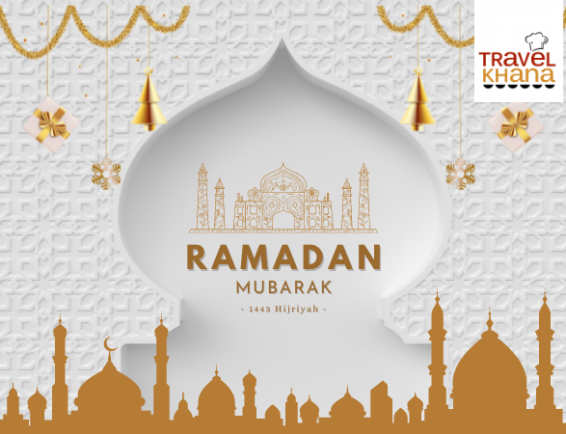Everything About “Ramadan” – “A Fest of Purity and Compassion”
What would I do if I could not feed a person who has watched Roza all day in Ramadan? “Hazrat Muhammad replied: Even a piece of date and a glass of water will do.”
Feeding a hungry person who comes to you is a sutra for people. In the holy month of Ramadan. A celebration of purity and abstinence that includes long practices of fasting. The purpose of fasting is to bring believers closer to God and remind them of the suffering of the less fortunate. People often donate to charity and feed the hungry during the month. Fasting is self-control. It is considered a means of physical and mental elimination of toxins by beating impulses such as morning coffee, smoking, and evening meals.
Ramadan is a celebration of doing well to society, and neighbours and living as simple a life as possible. Ramadan is the 9th month of the Islamic calendar, celebrated with extreme cleanliness, hygiene, and prayer offerings. According to the Arabic dictionary, the meaning of Ramadan is “strong heat and hot earth, lack of food and drink”. The entire month of Ramadan is spent in charity, swimming, and purity of heart and body.
Historical facts about Ramadan
The month of Ramadan is also known as “Ramadan”. People of the Muslim community spread throughout the world bathe in the month of Ramadan. The month is strictly flexible offering 5 “Namaz” or “Ibadat”. The followers of Islam around the world recite the verses of the Holy Quran and those people who cannot read devote themselves to listening to the verses of this holy book. It is believed that during the month of Ramadan, the verses of the Holy Quran were first revealed to the prophet Hazrat Mohammad. Therefore the Muslim community began to bathe and follow a pure life during the holy month of Ramadan.
The concept of Roza
Observant Muslim citizens practice complete fasting and penance and do not eat anything during the daytime of the month of Ramadan. This means they must eat before sunrise and after sunset; only twice in a 24-hour cycle. This is a broad term for Pink, but it is much more than a swim or a fast day. Pink is a time of self-reconstruction to cleanse the body and mind. Rosa enforces charity, service, the sacrifice of luxury and comfort, promotes brotherhood, and curbs fighting slander, and gossip. Roza holy moments also promote eating a hungry person or “Rozadar” (Muslim followers who swim all day) during “Iftar” or “Sahar”.
Everyone traditionally breaks their fast like the Prophet Muhammad about 1400 years ago, with a sip of water and dates at sunset at that time. That first sip of water is the most awaited moment of the day.
Iftar and Shahari
People who fast all day break their fast or swim after sunset called Iftar or Iftar. Those people who are capable enough to organize the “Iftar Party” and feed the people around them. Shahari is the same concept when Rozadar wakes up early in the morning and after “Namaz” eats light food for the rest of the day.
Payers and offerings during the month of Ramadan
Followers are expected to offer “Namaz” 5 times a day. in their daily routine and it can even be decisive for Roza or Ramadan. “Namaz” is the duty of every worshiper, which he must perform with a pure heart. In the month of Ramadan, Namaz and Ibadat are organized in the nearby mosques where all the followers gather and pray to the almighty. During namaz, they praise the almighty supreme power and ask them for a kindness called “Dua”.
During namaz, worshipers face “Makkah” towards the holy place and then pray Khuda. . The teachings of Quran Sharif are recited during Namaz and prayers are prepared for the Lord’s kindness and his care towards them and their families.
Legend of Shab-E-Kadar
Shab-E-Kadar is known as “Sataisa” among the followers of Islam in India. It is the great day of Ramadan which is celebrated on the 27th day of Ramadan. It is believed that on the night of the 27th day of Ramadan, an angel named “Farishta” came to Prophet Hazrat Mohammad and revealed the verses of the Quran. This day is spent in all mercy, love, fasting, and prayer. The legend of this night marks the day when the Holy Quran Sharif first appeared in the existence of Islamic culture and life. Most Muslims stay awake all night on Shab-E-Kadar reciting Quranic verses. It is also believed that those people who could not observe Roza every day during Ramadan, they can observe Roza on Shab-E-Kadar day, and may the Almighty God bless them with all happiness and free them from everything. Sins and bad karmas. Children, the sick, and the elderly must observe Roza in Shab-E-Kadar to fulfill their duty to Islam and the truth of God.
People who fast in Shab-E-Kadar also offer Iftar to people who cannot. , to do charity and help the poorer part of the society. Payers and Iftar parties are also organized on this day near mosques, congregation houses, and private premises.
Duties of Muslim followers in the Holy Month of Ramadan –
Quran teachings also promote brotherhood, love, and faith in God, and Quran verses ask all Muslim followers to fulfill their duties sincerely and contribute to the upliftment. of brotherhood society and neighbors. These tasks become crucial and part of the daily life of Muslim followers. These tasks are
- Roza – The first and most important duty of a follower of Islam is to observe Roza during Ramadan.
- “Quran Tilawat” is obligatory. All followers of Islam must recite the verses of Quran Sharif and those who cannot read must hear it.
- Offering “Tarawih Namaz”. Although all five Namaz offerings are obligatory, the Namaz offered at night is still a special obligation for Muslim followers.
- “Ittefaq” is another duty of the followers of Islam. People sitting together with the community members pray to the almighty power for the good of the community. This session takes place in a public place and there is silence during the Ittefaq prayer.
- Zakat – Zakat is the duty of every earning Muslim adult. It is believed that every Muslim should donate 2.5% of his annual income to uplift society and help the poor.
- Neki – Muslims also must donate generously to the poor section of society to help them survive a famine and fulfill their basic needs.
- Dua – During Ramadan, it is obligatory to pray and thank God for His kindness and blessings. Apart from all this, refraining from gossip and sexual activity, backstabbing and fighting are also obligatory during Ramadan.
First Day of Shaivaal
The first day of the month of Shaivaal in the Islamic calendar brings much joy with the biggest festival of Islam also known as “Eid-Ul-Fitr”. People start their day by going to the nearby mosque and offering Namaz to the community members. People also offer Dua to Khuda. “Dua” is offered to the Lord to keep Rozadar working during the pure month of Ramadan. The day is celebrated by exchanging gifts and money between friends and family members. This day is considered as the successful end of the holy month and the beginning of the new month with the purity and blessing of Khuda.
Delicious Iftar
This is the best part of the festivals. If you are one of those who think that what is the point of food and delicious preparations during a swimming or fasting month, then this is just for you. Some dishes and preparations are ready for Iftar and Shahr. The last day of Eid also has its own Atria charm. So here are some of the most delicious foods to know about the holy meals of Ramadan and Eid.
Iftar and Shari meals in India mainly include salads fruits, lamb/chicken curry and bread, and rolls, butter, sweets, and Sharbat (juices/lime water). However, some traditional dishes are prepared during Ramadan.
- Dates – Muslims break their fast with three pieces of dates and water.
- Shorba – Commonly known soups form the main part of Shahr or Iftar. People prepare different soups consisting of vegetables and meat.
- Fattoush – This is a traditional salad made from fresh vegetables, topped with toasted or fried bread slices and pomegranate seeds. This is a must-eat for people who like Roza.
- Dry Fruits and Juices – People generally enjoy a mixture of dry fruits and nuts with Gulab Sharbat or juice.
- Shahri Keema – This is another non-vegetarian specially prepared for Shahri, a pre-sunrise breakfast. These preparations are nutritious and fine enough to be easily digested.
The holy month of Ramadan ends with the arrival of the next Islamic month “Shaivaal” and the celebration of Eid-Ul-Fitr. The month of Ramadan brings purity, harmony, and inner reflection to the lives of all those who fulfill their duties given by the Almighty. So regardless of your religion and eating habits, enjoy a pious iftar meal with your neighbor or local in the market. Team Travelkhana wishes everyone a hearty “Ramadan Mubarak” and prays for the general development and goodness of people. !!!!

